Becoming a better business person isn’t always about studying the market, reading books by gurus, or going back to school. Playing these 10 business board games will help you improve your skills the fun way.
BP’s Picks for Best Business Board Games for Businesses?
- Best Overall Business Board Game: Catan
- Most Cutthroat Business Board Game: Monopoly
- Best Game for Money Management: The Market of Alturien
- Best Family Game: Ticket to Ride
- Best Game for Becoming an Expert Negotiator: I’m the Boss!
- Best Full-Scale Empire-Building Game: Steam: Rails to Riches
- Best Luck-Based Business Game: Machi Koro
- Most Unconventional Business Board Game: Takenoko
- Best Investment-Focused Business Board Game: Acquire
- Best Co-op Board Game: The Forbidden Series
What to Look for in a Business Board Game or Card Game

The best business board games can help you develop skills such as:
- Short-term and long-term strategic planning
- Investment and risk management
- Asset management, financial management, and bookkeeping
- Negotiation
- Logistics and supply chain management
- Strategic decision-making
- Teamwork and leadership
- Problem-solving
Different games focus more strongly on different aspects of business, so you should consider which game best meets your needs. Other factors to consider when picking out a business board game to play include:
- Recommended ages
- Number of players
- Playing time
- Level of complexity
- Amount of random chance involved
- Format (traditional game board, cards, tiles, etc.)
- Price
- Replay value (difficult levels, advanced rules, shifting game board)
From longtime classic money games like Monopoly to more unconventional games that emphasize strategy, there’s something on our best business board games list that’s sure to please anyone seeking to gamify professional development.
1. Best Overall Business Board Game: Catan
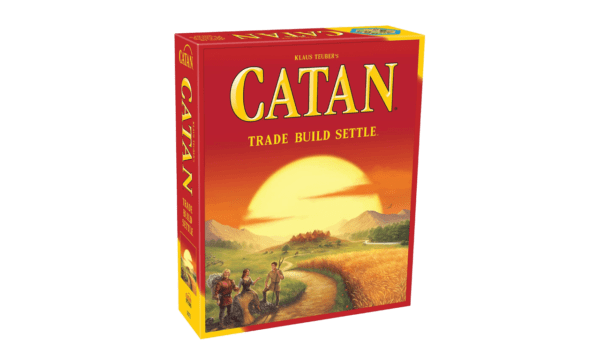
Widely considered to be one of the best board games, period, Catan is also a phenomenal strategy game for established and aspiring business professionals. With nearly 20,000 ratings and reviews on Amazon and a near-perfect 4.8-star rating, the worldwide popularity of this resource acquisition and trading game is undeniable.
How to Play the Game
Originally published as The Settlers of Catan, the game’s wide-ranging appeal is due, at least in part, to its beautifully simple game mechanics. You won’t need to memorize pages of complicated rules that take the fun out of playing. You will, however, need to think strategically, trade resources wisely, and make the best of the aspects of the game that result from pure chance.
You start the game as a humble but ambitious settler on the island of Catan. Dice rolls decide who gets what resources at what times, but how you use those resources to build up roads, settlements, and cities is up to you. The first player to rack up 10 victory points wins.
The gameboard that makes up the island of Catan consists of tiles and numbers that can be arranged in any order, allowing for plenty of new configurations.
What Makes This Game Great for Business
To win Catan, just as to succeed in the business world, you need to expand your position on the board and manage your resources. In the game, these resources include bricks, lumber, grain, ore, and wool. Players fight for control of these resources, and having control over one resource allows for a better advantage when it comes to trades.
Managing your resources is an integral part of playing Catan, because different upgrades require different types and amounts of resources. For instance, without bricks and lumber, players cannot build the roads that are necessary to connect settlements.
The trading aspect of the game itself is another factor that makes Catan one of the best board games for business. Players negotiate with each other to get the resources they need without giving opponents the advantage.
Players can utilize ports to trade their resources at a fixed ratio instead of trading with opponents. However, they will pay a higher cost to trade resources and take longer to accumulate the victory points needed to win the game.
Catan is intended for three to four players ages 10 and up, and games typically take 45 to 90 minutes. Extension packs can be purchased to build upon the base game, allowing for five players or even six players to participate. You can also purchase expansion packs for different themes, including Traders & Barbarians.
2. Most Cutthroat Business Board Game: Monopoly
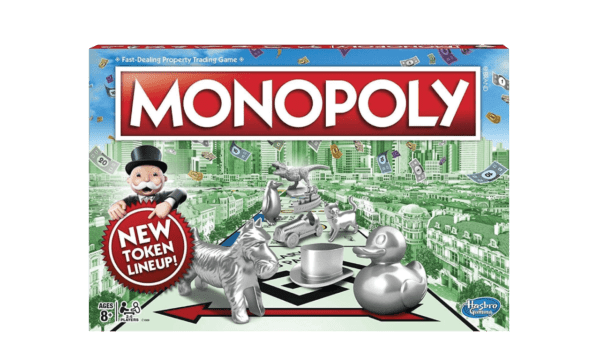
Could any list of the best business board games be complete without including Monopoly? This classic game needs little introduction, with a 4.8-star rating based on more than 20,000 global ratings and reviews on Amazon. Monopoly has been entertaining (and sometimes frustrating) children and adults for more than 80 years.
How to Play the Game
In Monopoly, players roll dice to make their way around the board, buying and building up their properties. Acquiring a monopoly will help you amass the most money while forcing your opponents to run out of cash and have to mortgage or sell their properties. The last capitalist standing wins.
The rules of buying and building up property are easy to learn and fun for the whole family. Kids ages 10 and up should be able to play this board game.
There are countless versions of this classic board game, with themes ranging from sports teams to dog breeds. Whichever version of Monopoly you choose will likely have a familiar layout, with eight groups of properties, four “railroads,” and two “utilities” to purchase.
What Makes This Game Great for Business
What makes the classic game Monopoly perfect for business is the mechanics behind it. Players fight for control of the board as they upgrade their properties. The better the property, the more the players earn. Players also are encouraged to trade with opponents, each trying to get the better end of the deal.
Monopoly also utilizes paper money, which players use to purchase and upgrade properties and pay other players. Handling paper cash makes the financial management aspect of Monopoly, including choosing when to spend and when to save, feel more like real life.
There’s a fair amount of luck involved in Monopoly due to the importance of dice rolls—and, of course, luck is a factor in business, too. But it’s not all chance. Monopoly is a strategy game, at least in some respects.
Your capital is limited, especially early on, so you must make tough decisions about what properties to buy and what properties to pass up. You have to decide when and on which properties to build houses and hotels. As the available properties become sparse and your competitors race toward putting together their own monopolies, you have to negotiate trades with other players.
3. Best Game for Money Management: The Market of Alturien
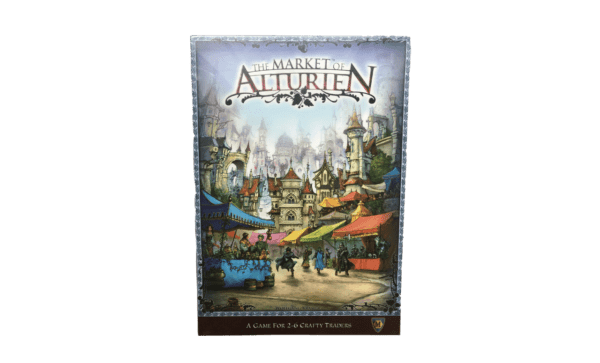
What if, instead of charging your fellow players “rent” for landing on your properties, you instead competed against them to win the patronage of customers controlled by dice rolls? That’s the premise behind The Market of Alturien, a money-focused strategy game set in a medieval market.
How to Play the Game
Players find The Market of Alturien easy to learn, in part because of the familiar elements the game shares with Monopoly. The goal is to be the first to buy three prestige cards, which means you have to use your money wisely to grow your capital quickly.
In this board game, as many as six players must out-strategize each other to get customers at the market to buy their wares instead of their opponents’. Part of how you do this is by building up your trading empire, much as you would upgrade your properties in Monopoly.
Although customers’ movements are based on dice rolls, they are a lot less random than what you find in Monopoly. Each turn, the active player can roll the dice and decide which of the seven different customer figures to move based on factors like proximity to their market stalls and the customer’s level of wealth.
Besides buying the prestige cards that can win you the game, you can opt to spend money on market stalls or investment cards that help you increase your profitability.
What Makes This Game Great for Business
The Market of Alturien is the property development and money acquisition game for players who like a little more strategy in their gameplay.
Do you roll the dice to gain patronage from the more plentiful customers at the copper level where the payoff is lower? Or do you greedily chase down the single gold customer who pays three times as much?
In real life, this reflects the challenges businesses face in pricing and marketing their products and services. Although a higher price gives you more profits for each sale you make, setting your fees too high could mean pricing an entire swath of the market out of your customer pool.
Should you save all your funds to buy the game-winning prestige cards? Or would you be better off building up your empire to be larger and more profitable? Deciding when, how, and how much to invest in building up their companies is one of the most difficult parts of being a business owner. Play things too safe, and your profits will stagnate; take too many risks, and you could sustain serious losses.
In The Market of Alturien, it’s up to you to find that perfect balance and to do so more effectively than your opponents.
Although a game of The Market of Alturien takes 60 to 120 minutes with two to six players, the gameplay feels fast-paced since you don’t need to totally eliminate other players’ finances or end up in a stalemate trying to make a trade. The game is easy to learn and suitable for kids ages 12 and up as well as adults.
4. Best Family Game: Ticket to Ride
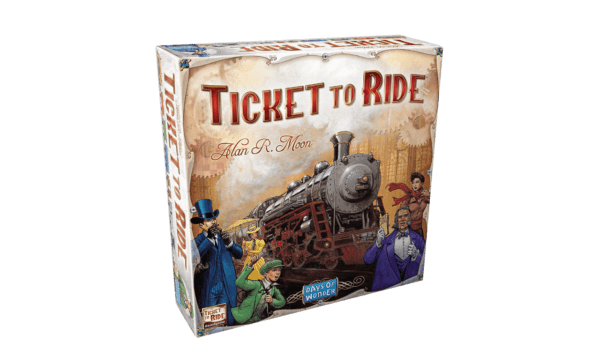
Managing logistics is part of running a business, and there’s no better way to learn than by playing a fun game called Ticket to Ride that revolves around claiming cross-country railway routes. You don’t have to be a train enthusiast to enjoy this award-winning railway-themed strategy game.
How to Play the Game
The game board of Ticket to Ride presents a map of the continental United States, with major U.S. cities labeled and connected with train routes. Your objective is to finish the game with the most points when one player runs low on the train car pieces.
Players of Ticket to Ride may earn points when they claim one stretch of a railway route between two cities as their own, but the points gained for these achievements are relatively small. Players earn higher amounts of points by completing Destination Ticket cards, which require you to connect cities farther apart using more than one stretch of railway tracks.
To claim the path between two cities for yourself, you need to put down the required number of train car cards of the same color. If game players opt to use a turn to draw these cards, they can draw blindly from the deck or from a pool of face-up cards.
The simplicity of Ticket to Ride’s gameplay mechanics makes it a hit with children as young as 8 years old, but the complexity of the strategy required will keep adults engaged and competitive. The game can accommodate as many as five players, and the limited number of train cars per player prevents the game from dragging on past the point where it stops being fun. Most games take around 60 minutes to play.
What Makes This Game Great for Business
Besides being a blast to play, this game is a true test of strategy and adaptability, both of which are essential for business owners. In the short term, you need to gather enough trains of the same color to claim each individual route between two cities.
Since different paths are different lengths, you have to be strategic. Are you better off using two matching train cards right away to claim a short path or holding onto them long enough to collect more and claim a longer path?
Complicating this decision is the choice players have to make between drawing train cards blindly from the deck or opting for one of the face-up cards. Having this option gives players more control over the chance aspect of the game and mimics the inherent gamble in investing. Like a business owner surveying the market, you need to decide if you can create the combinations of assets you need based on the sure options available to you or whether you should take a bigger risk for the potential of a better reward.
Accruing a few points here and there for putting down a path of trains isn’t enough to win you the game. Besides the short-term strategy of acquiring and managing train cards, you need to work toward that larger goal of completing long routes that match your destination cards. If you don’t connect the cities listed on your destination cards, you lose points instead of gaining them.
Even choosing which routes to take to complete your destination is a test of strategy. More direct routes are easier to claim, but stringing together a longer route would give you more points. If other game players claim the path you needed to complete the route to your destination, you’ve got to adapt and come up with a backup plan before it’s too late.
You also need to decide when and whether to draw additional Destination Ticket cards. Successfully completing these cards will allow you to overtake your opponents, but failing to do so could subtract enough of your points to cost you the game.
In the game Ticket to Ride, as in business, you want to take risks that are big enough to pay off, but you don’t want to saddle your endeavors with big, poorly timed risks that drag your company down.
5. Best Game for Becoming an Expert Negotiator: I’m the Boss!
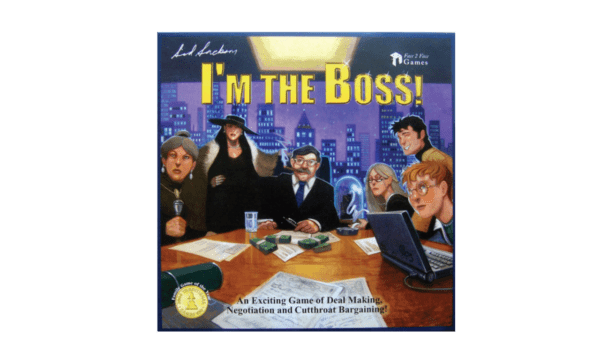
Available in both the original board game format and a simplified card game format, I’m the Boss! has more obvious ties to the corporate world. Regardless of which version you choose, you’re in for a game that’s guaranteed to test your negotiation skills.
How to Play the Game
Both versions of the game cast players as investors using the influence cards dealt to them to negotiate their stakes in a business deal. In the board game, the spaces on the board represent deals to negotiate, while in the card game, each round is a separate business deal.
Although you take turns in this game, your actions aren’t limited to what happens when it’s officially your turn. Once one player opens negotiations on a business deal, other players jump in to negotiate a deal that favors them or sabotage a deal that doesn’t.
After all players participating in any given business deal reach a final agreement, the bank pays out dividends to each player according to the shares negotiated. The goal is to have the most money by the end of the game.
In the card game, gameplay ends after a fixed number of rounds. In the board game, dice rolls that begin as you approach the end of the game are what determine which deal is your last. This keeps players on their toes, since one late-game lackluster deal could give the win to your opponent.
What Makes This Game Great for Business
What makes I’m the Boss! such an excellent business game isn’t just a superficial theme or reliance on game currency. The gameplay itself focuses on a must-have skill for business professionals: negotiating.
In business, you negotiate prices for materials and equipment from vendors. You negotiate compensation and contract terms when hiring in-house employees and retaining outsourced services.
In some industries, you might negotiate the cost of your products and services directly with customers. Even in industries where haggling isn’t common, your pricing should take into account what customers would be willing to pay, which may require you to run through an informal mock negotiation in your head.
Chance plays a role in both versions of I’m the Boss, in terms of the cards dealt to you and, in the board game, the dice-roll aspect. However, your business acumen comes into play as you figure out what leverage you have and how to apply that leverage to get the best deal.
Pressing your opponents too hard could lead to backlash that costs you (literally), but being too timid a negotiator will keep you from getting ahead. Negotiation is an art, not a science. In the board game I’m the Boss!, as in real life, the strongest negotiators are able to evaluate the nuances of the business deal and their fellow negotiators’ wants, fears, and hesitations.
6. Best Full-Scale Empire-Building Game: Steam: Rails to Riches

Another train-themed board game for business, Steam: Rails to Riches digs into supply-chain management. While Ticket to Ride is all about claiming the routes that connect cities by rail, the empire-building game Steam asks players to build train tracks and the cities they go to, upgrade your trains and your cities, and deliver goods by rail to gain money.
How to Play the Game
Steam is one of the more complicated games on our list. With a recommended starting age of 12, it’s not suitable for young kids, but teens should be able to handle it. Not only do you have a lot of tasks to balance and a financial component to manage, players’ turn order also changes based on the actions they take throughout the game.
Each turn consists of six distinct phases in which players do the following:
- Choose actions to take, which can include upgrading trains or destination cities
- Build train tracks across the map of the game board
- Transport goods to earn income and points
- Resolve income and expenses by collecting money or paying debts
- Determine turn order for the next turn
- Set up the next turn
The goal of Steam is to have the most victory points at the end of the game. Players may earn victory points for having positive income, completing links of train tracks, and transporting goods. However, you can also lose points, and your actions can sometimes award points or income to your opponent.
What Makes This Game Great for Business
As a full-scale empire-building game, Steam reflects the many demands business owners must meet to build an enterprise from the ground up. It’s not enough to worry about the power of your train and the goods you’re currently moving. You also need to focus on other aspects of the supply chain, like the tracks your trains must take to their destinations and how you can make these trips more profitable by increasing demand in these destinations.
Throughout the game, there’s a financial component that matches the real business world a lot more closely than Monopoly. Finding your way out of debt is part of the game, especially in the early turns. Later, once you’ve raised enough income to run and grow your empire without sinking into a cycle of debt, you focus on acquiring the victory points that could win you the game.
Finally, thanks to the debt aspect of the game and the income and expenses phase of gameplay that’s part of each turn, Steam provides plenty of practice bookkeeping experience. It’s also an exercise in investment strategy as you decide which one of the seven possible actions you want to take each turn, where and how to build tracks, and whether to focus on building income or acquiring victory points at any given time.
7. Best Luck-Based Business Game: Machi Koro
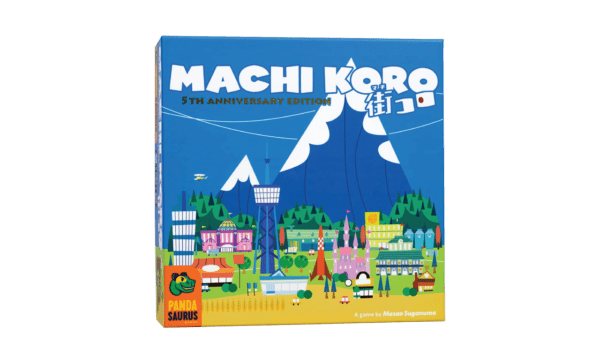
In Machi Koro, you’re not building a business. Instead, you’re building a whole city. This fun, fast-paced game involves its share of random chance, but it also takes strategy to develop your city from one turn to the next.
How to Play the Game
Every player in Machi Koro is the mayor of their city. To develop your city, you need money, which you get from dice rolls that activate different developments.
The game follows a cycle: Good dice rolls activate the developments you need to get money, which, in turn, allow you to buy more developments and, ultimately, landmarks. Bad dice rolls will hinder your efforts to keep developing your property, which undercuts your ability to buy developments that activate according to different dice rolls.
Your job as mayor of Machi Koro is to use the money you get from your dice rolls to make the best investments in developing your city so that you can construct four landmarks.
Since you start out with only a wheat field and a bakery, that’s a lot to accomplish. Work your way up by purchasing developments that award you income based on the roll of the dice on your turn or other players’ turns.
What Makes This Game Great for Business
There’s a lot of overlap between what it takes to grow a business and what it takes to develop a city. In Machi Koro, the focus on development is akin to an emphasis on investment strategy. How do you manage the money you have to bring in even more cash? That’s the question players of Machi Koro have to tackle.
Although no business owner wants to hear it, luck can play a part in a company’s success or lack thereof. However, in Machi Koro, as in business, you have some opportunity to make your own luck. Although you can’t influence how the dice land, you can choose to invest in developments that maximize your dice rolls and minimize your risk of a passive turn that accomplishes little.
Should you buy an assortment of developments that ensures income no matter how the dice fall, or should you build up your ability to profit when specific numbers are rolled? That’s where the strategy aspect comes in.
8. Most Unconventional Business Board Game: Takenoko
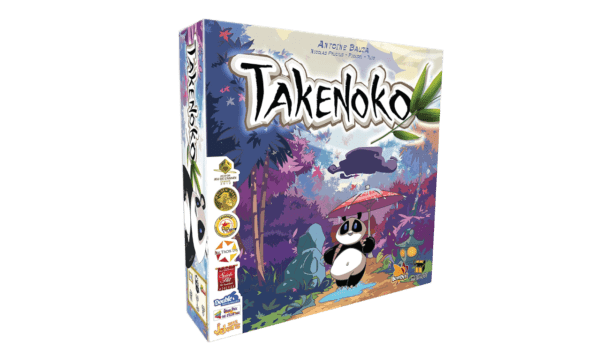
Running a business requires balancing different priorities, goals, and strategies. Real business owners have to work toward multiple goals at a time and decide how to best use their capital, time, skills, equipment, and human resources. It’s not as simple as rolling the dice and deciding whether or not to purchase the property you landed on by chance.
That’s what makes Takenoko such a great game for business in spite of revolving around a theme that may seem, at first glance, to have little to do with the corporate world.
How to Play the Game
Takenoko sets players to the task of racking up points by meeting specific objectives as they move a giant panda and a gardener across an ever-growing board. The win goes to the player who has the most points when any one player has completed the number of objectives required to end the game.
Throughout the game, two to four players strategically build the game board out of tiles, so each individual playthrough is unique. Players get to choose how to chase their game-winning points: by building land tiles in a specified formation, growing the right patterns of different colors of bamboo to different heights, and sending the panda to eat the right combination of bamboo colors.
Objective cards in all three categories give players different options for scoring points. During each turn, players have to choose which of the turn options they want to take—and how to apply them—to work toward their objectives.
What Makes This Game Great for Business
Takenoko is a fun game that isn’t just for business buffs. While there’s no play money or property ownership, Takenoko undoubtedly gives you a taste of experiences very common in the business world.
Working toward multiple objectives that are worth different points requires you to strategize to meet constantly moving goalposts. Just like real business owners, you need to choose how to best use your resources—in this case, irrigation channels, tile placing opportunities, and the movements of the panda and the gardener.
A Takenoko Chibis expansion set adds Miss Panda and an assortment of baby pandas to the mix. Takenoko is a board game best suited for ages 8 and up and has a gameplay time of 45 minutes, making it an excellent family game as well as a useful, if less conventional, business game.
9. Best Investment-Focused Business Board Game: Acquire
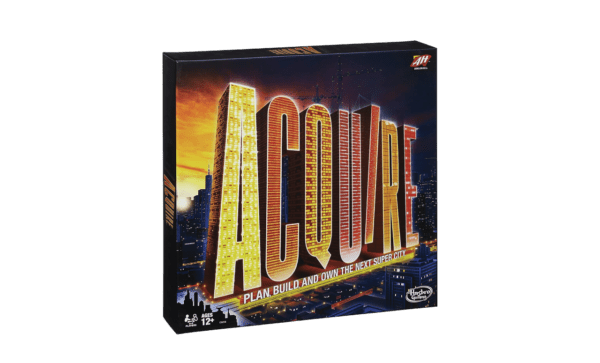
Another favorite business board game by Sid Sackson, Acquire is all about mergers, acquisitions, and stocks. In short, this money-focused game themed around hotel ownership is a great way to teach people (kids and adults alike) about financial investments.
How to Play the Game
In Acquire, players put down tiles to establish, grow, or merge hotels. You don’t just manage the expansion of your hotels on the board, though. You also buy stock in any hotel chain on the board, which gives you a cut of its income.
You win the game by having the most wealth when one hotel chain becomes too large or no more hotels on the board are able to be acquired. Player’s wealth consists of both any remaining cash and their stocks, which they sell upon completion of the game.
What Makes This Game Great for Business
Acquire’s focus on mergers and investments makes the game’s business connection obvious, but there’s more to it than that. Each player-turned-venture-capitalist must strike the right balance between liquid assets and investment income.
Although you will eventually liquidate all of your assets to arrive at a final dollar amount at the end of the game, the mix of assets you have throughout the game determines what steps you’re able to take. Running out of money too early can stop you from making the right moves, but shying away from buying stocks and shares will keep you from out-earning your competitors.
There’s also plenty of strategy involved in deciding when and where to place a hotel or merge hotel chains. Although randomly drawn tiles must be placed in specific spots on the game board, you should keep track of what’s going on around these spaces and make smart choices about when to play a tile in a space to avoid or prompt a merger.
10. Best Co-op Board Game: The Forbidden Series
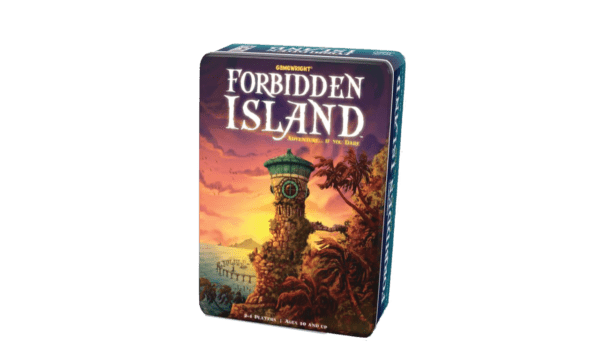
If you’ve never played a cooperative, or co-op, board game before, the Forbidden game series by Gamewright is an excellent introduction that will test your leadership skills. Players band together to accomplish an objective and escape perilous situations.
How to Play the Game
Matt Leacock’s series of Forbidden cooperative games sends players traversing a game board made out of tiles, so no two playthroughs are quite the same.
In Forbidden Island, you must find and salvage treasures from a rapidly sinking island. Forbidden Desert requires you to locate the pieces of a buried airship so you can escape the desert before falling prey to sandstorms or running out of water. The third game in the series, Forbidden Sky, requires players to connect the circuit needed to successfully launch a rocket from a platform in the sky without being electrocuted or blown away by a storm.
Each game requires players in different roles with unique abilities to play cards and interact with the game board to accomplish the group objective. However, the game itself is trying to take players out with cards that reduce their health and derail their progress.
Everyone loses if any one player dies in the game or if a catastrophic event occurs, like the island’s helipad going under.
Each game has options for different difficulty levels, making it fun for the whole family (ages 10 and up) but also challenging enough for an all-grownups game night.
What Makes This Game Great for Business
The co-op aspect of the game is excellent for testing and cultivating your management skills. Like real workers in your company, the adventurers on your team each have their own strengths and weaknesses.
The mix of roles and abilities among the players on your team should influence how you play the game, just as the strategies you use in business should draw on your assets and the strengths of your team. If players fail to work together, you lose the game, just as your company suffers when its stakeholders and employees aren’t able to work as a team.
Whether you play this game as a team-building experience with your executive officers or as just a fun way to experiment with leadership strategies, there’s a lot to love about this popular game series.
Conclusion
It doesn’t matter whether you’re a chief executive with years of management experience or a recent college graduate working your way up the ladder, practicing your skills through strategy games will help you become more proficient in the competencies that matter most in the corporate world.

